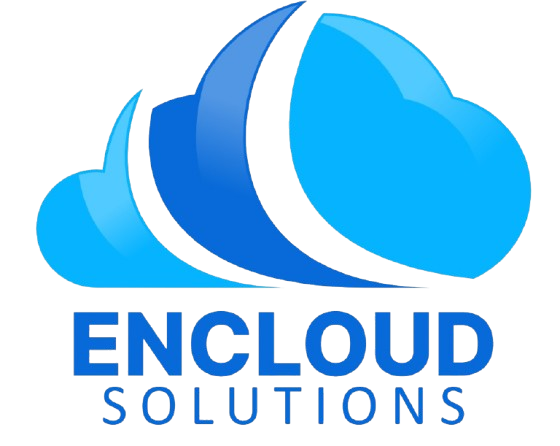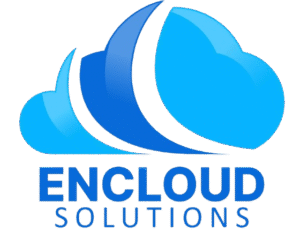
Zoho CRM has become a market-leading cloud CRM platform used by over 700,000 businesses across 150+ countries. It offers a 360° view of your customer data (sales, marketing, and support) in one place, making it easy to track leads, contacts, and deals. In 2025, with global CRM spending projected to exceed $114.4B by 2027, businesses need agile, scalable CRM solutions. Zoho CRM fits this need by combining user-friendly dashboards, advanced analytics, and AI-driven insights. If you’re ready to streamline your business with Zoho CRM, contact us today through the form below.
Why Choose Zoho CRM for Your Business
At Encloud Solutions, Zoho CRM development is our core expertise. As a Zoho partner, we help you leverage these features fully. Our clients use Zoho CRM to manage sales pipelines, run marketing campaigns, and deliver top-notch support. Get in touch with our team to learn how Zoho CRM can work for your business. Key advantages of Zoho CRM include:
1. 360° Customer View
All customer interactions (emails, calls, social media, support tickets) are stored in one system. Everyone on your team sees the latest info.
2. Customizable Modules
Tailor fields, layouts, and pipelines to match your processes. Build only the modules you need, so the CRM works the way you do.
3. Seamless Integrations
Built-in connectors (Google Workspace, Microsoft 365, MailChimp, etc.) keep data flowing automatically. No more manual uploads – your apps all speak to each other.
4. Powerful Automation
Workflows, blueprints, and macros eliminate repetitive tasks. Studies show CRM automation can boost productivity by ~30%, letting sales representativess focus on closing deals instead of paperwork.
By choosing Zoho CRM, you get a future-proof platform that grows with your business – backed by expert support from Encloud Solutions. Reach out through our contact form to start your Zoho CRM journey today.
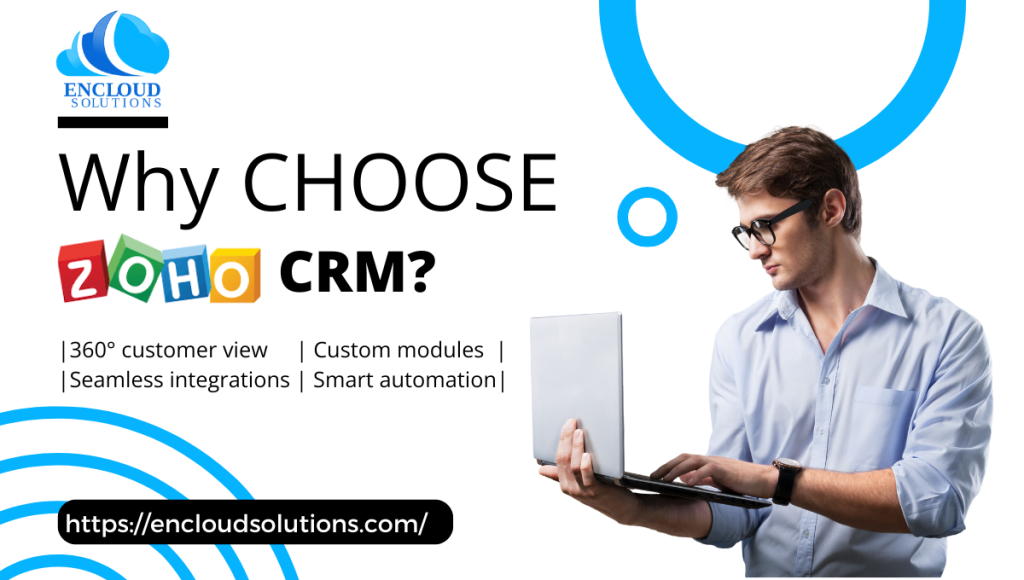
Zoho CRM Development Services at Encloud Solutions
For businesses looking for a skilled developer Zoho CRM, our team is ready to help. Encloud Solutions is a certified Zoho CRM developer company delivering custom Zoho CRM development and implementations. Our experts help companies set up, integrate, and customize Zoho CRM to fit their unique processes. We handle everything from data migration and user training to Zoho CRM setup and customization, ensuring your CRM goes live quickly and smoothly. Fill out our contact form to discuss your CRM setup or customization needs.
Also Read: Zoho Field Service Software That Integrates with QuickBooks
Why custom development? Off-the-shelf CRMs often have features you don’t need and workflows that don’t match your business. A tailored Zoho CRM adds only the functionality you want. In practice, companies with custom CRM solutions often see 20–30% higher productivity and a strong ROI (roughly $8.71 returned for every $1 invested). Many of our clients recoup their implementation costs within a year thanks to streamlined operations and improved adoption. Talk to our experts about how custom Zoho CRM development can improve your ROI – just send us a quick message using the contact form. Our Zoho CRM services include:
1. Custom Development
We build new modules, custom fields, and user interfaces so the CRM matches your industry and business needs.
2. Expert Guidance
Certified Zoho CRM professionals work with your team to design the right solution. We analyze your sales and support processes and configure Zoho CRM accordingly.
3. Integrations
We connect Zoho CRM to your existing systems (ERP, email marketing, e-commerce, and more). For example, we can synchronize inventory from your ERP, so product levels update in real-time and capture leads from your website forms directly into Zoho.
4. Implementation & Support
From initial planning to end-user training, we provide end-to-end service. After go-live, we offer ongoing support. Whenever you need a Zoho CRM developer to add a feature or fix an issue, we’re here to help.
5. Zoho CRM Customizations
We cover all Zoho CRM customizations (also spelled Zoho CRM customisation). This includes advanced tweaks to modules, data layouts, and automation rules, so the system evolves as your business does.
By partnering with Encloud Solutions, you ensure your Zoho CRM exactly fits your needs, no compromises, no unused features. Contact us to get personalized guidance from our certified Zoho CRM developers.
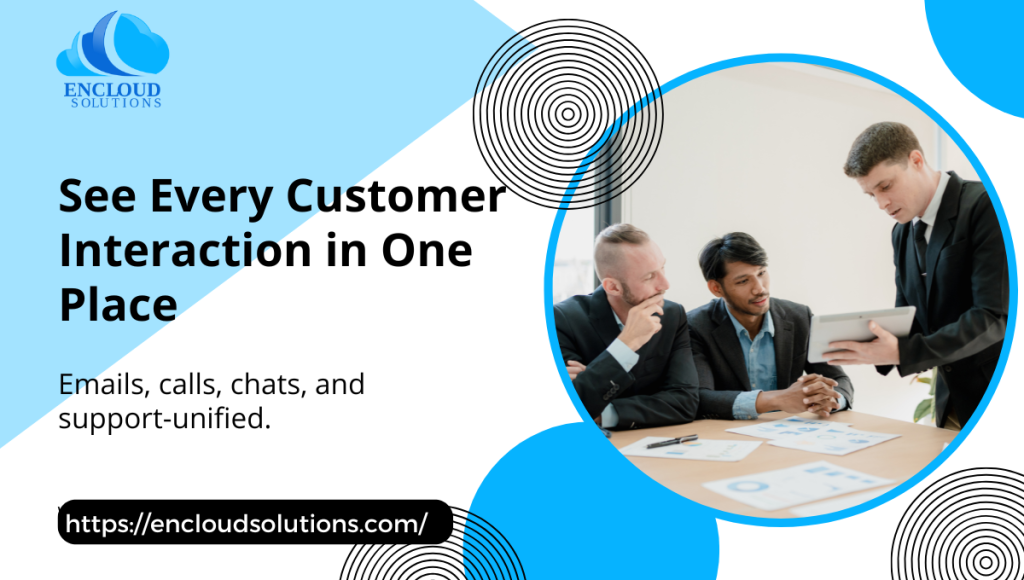
Customizing and Extending Zoho CRM
Every business has unique workflows. With customizing Zoho CRM, Encloud Solutions makes the CRM conform to you. We create Zoho CRM custom modules and fields to capture the data you care about. For example, if you run a solar-energy company, we might add a module for Installations and link it to customer accounts. We then customize Zoho CRM so sales reps see only relevant fields, which makes the interface intuitive. If you want a CRM that works exactly the way your business does, get in touch with us today. Customization highlights:
1. Custom Modules & Fields
Design new modules or extend existing ones. Use lookup fields to relate data (e.g., link a Warranty Record to a product and customer).
2. Workflows & Blueprints
Automate tasks like lead assignment, email notifications, and approvals. For example, automatically send a follow-up email when a deal stage changes.
3. Custom Scripting
Using Zoho’s low-code Deluge or Java SDK, we implement advanced logic. A key example is Zoho CRM get emails under custom modules. Incoming emails can be automatically attached to the correct record based on content.
4. Data Transfers
Handle complex cases such as Zoho CRM transferring linked attachments to another module. Suppose an invoice is created in one module; our code can copy its attachment link to a related project record automatically.
5. Advanced Relationships
Link records flexibly. We can link a meeting to multiple accounts (if one meeting involves several clients) or relate custom calendar events to contacts.
Also Read: ERP for Small Companies
By focusing on how to customize Zoho CRM precisely, we help teams adopt the system quickly. Tailored CRMs reduce manual work and errors – one study noted ~20–30% productivity gains with custom software. A custom Zoho CRM keeps your team efficient and data clean. Reach out now to find out how we can tailor Zoho CRM for your organization.

Zoho CRM Integration and Automation
Zoho CRM really excels when connected to the rest of your tech stack. We are experts in email integration with Zoho CRM, so you never lose track of conversations. For example:
1. Zoho CRM email integration
Connect your Gmail or Office 365 account to Zoho CRM. With the built-in Zoho mail client, all sent/received emails automatically log to the correct contacts and leads. This way, every customer email is captured without extra effort.
2. Zoho CRM and Zoho Calendar integration
Sync meetings and events from Google Calendar or Outlook with Zoho CRM. A demo scheduled in Google Calendar will appear on the related contact’s timeline in CRM, keeping sales appointments in one place.
3. Zoho CRM Google Meet integration
Automatically attach Google Meet links and recordings to CRM events. When a virtual meeting is created, the link is stored in Zoho so you can easily follow up with notes.
4. How to import leads in Zoho CRM
We help onboard new leads from spreadsheets or other sources. Imported leads retain their source tags and campaign data, so your marketing funnel stays intact.
5. Zoho CRM integration with Outlook
Use Zoho’s Outlook plugin to access CRM contacts and log Outlook emails or tasks to Zoho CRM. Your sales team can work in Outlook while Zoho CRM updates in the background.
Beyond email and calendar, we connect Zoho CRM to virtually any system. Whether it’s adding telephony integration (RingCentral/Twilio) so calls auto-log, or syncing e-commerce data so orders appear in CRM, we make it happen. These automations pay off: studies find companies using CRM automation see up to a 245% increase in revenue and 23% lower lead acquisition costs, since nothing falls through the cracks. Fill out our contact form to integrate Zoho CRM seamlessly with your existing systems.
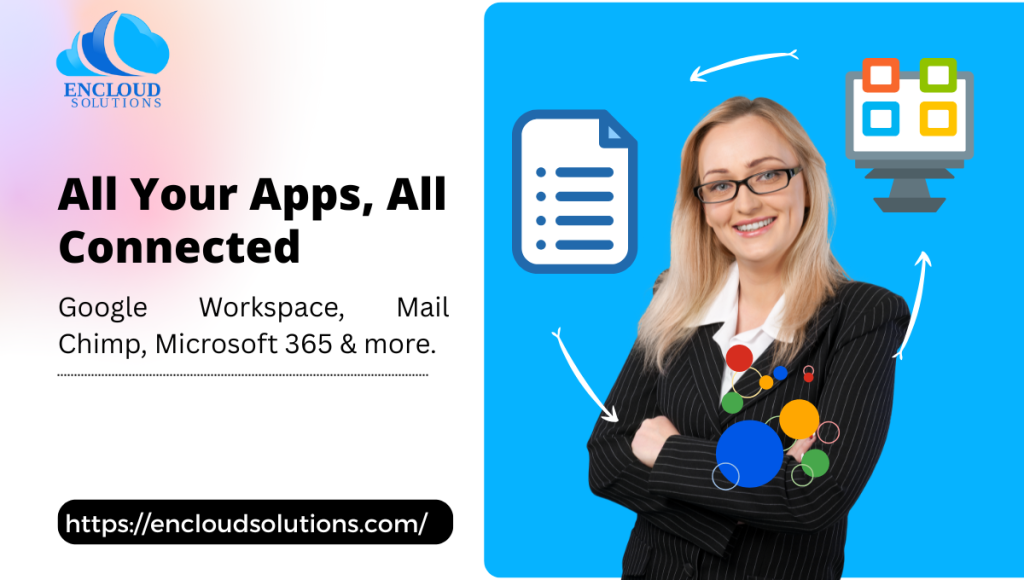
Zoho CRM Dashboards and Analytics
Getting insights from your CRM data is vital. Zoho CRM’s dashboards and reports let you visualize performance at a glance. Encloud configures dashboards tailored to your KPIs. For example:
1. Custom Dashboards
Show pipeline summaries, conversion rates, and team targets on one screen. Give each user a personalized view (sales rep vs. manager).
2. Real-time Reports
Drill down by region, product line, or campaign. Spot trends and answer questions on the fly (e.g., “Which sales rep leads are converting best?”).
3. Forecasting & AI
Zoho’s Zia can predict sales trends and alert you to at-risk deals. Using AI-powered forecasts, managers know which quotas may be in danger before it’s too late.
4. Automated Analytics
Schedule reports to email your leadership team weekly. This saves time and ensures strategic decisions are data-driven.
By tailoring Zoho CRM dashboards to your business, you unlock actionable intelligence. Companies leveraging CRM analytics have seen marketing costs drop ~23% and conversion rates significantly improve. With the right reports, you’ll spot issues early and seize opportunities faster. Talk to our team to design dashboards and reports that drive better decisions – use the contact form to get started.
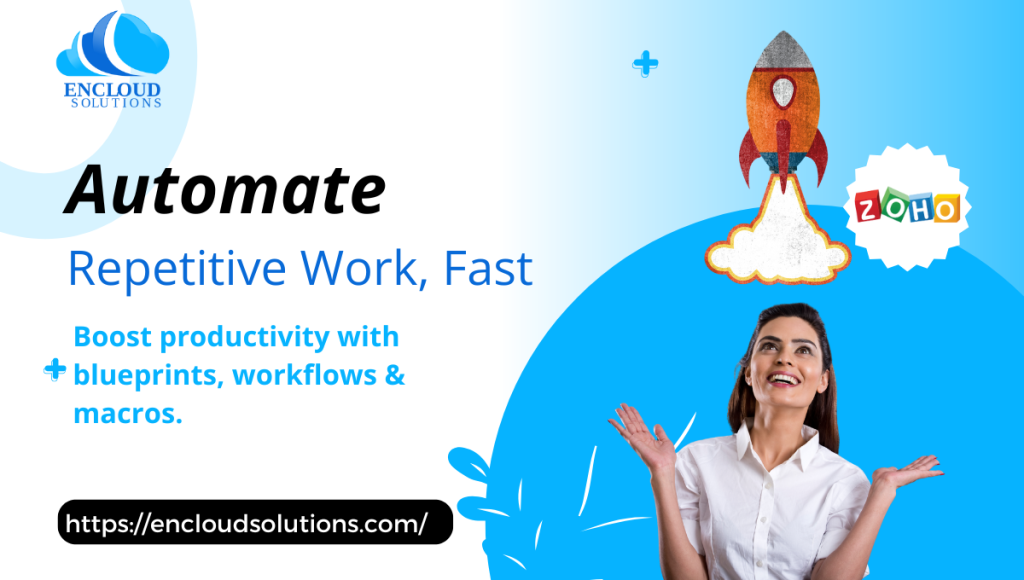
Zoho CRM Pricing and Editions (2025)
Zoho CRM offers editions that scale with your needs. Here’s a quick comparison (annual subscription, per-user pricing):
| Edition | Price (User/Month) | Highlights |
| Free (Standard) | Free for 3 users | Basic lead/contact/deal tracking, tasks, and email templates |
| Standard | $14 | All Free + mass email campaigns, custom modules, workflows |
| Professional | $23 | Standard + Blueprint automation, CPQ/quotes, inventory mgmt |
| Enterprise | $40 | Professional + Zia AI assistant, territory management, portals |
| Ultimate | $52 | Enterprise + enhanced limits, custom AI/ML platform, analytics |
(All prices from Zoho’s official edition comparison. Local taxes may apply.) Each higher edition includes all features of the lower tier, plus advanced tools for growth. Even the entry-level Standard gives you a robust CRM. And since you only pay for users you need, Zoho CRM projects often pay back quickly – our clients typically achieve ~55% ROI in the first year due to efficiency gains and increased sales. If you’re not sure which Zoho CRM edition fits your company, contact us for a free consultation.
Also Read: ERP vs Cloud ERP
Partnering with Encloud Solutions
Investing in an experienced Zoho partner pays dividends. Encloud Solutions not only implements Zoho CRM, but becomes your ongoing advisor. Our certified developers and consultants ensure the system aligns with your strategy. We document your unique workflows, train your staff, and drive high user adoption (which is critical for success). Reach out through our contact form to partner with our Zoho-certified team today.
As Zoho releases new features, we keep you updated. When Google Meet or email tools update, we’ll integrate them into your CRM. This means you always benefit from Zoho’s latest capabilities without extra hassle. Stay ahead with expert Zoho CRM support – contact us anytime to learn how.
In short, our expertise means fewer headaches for you. We turn Zoho CRM into your competitive advantage, delivering stronger growth and efficiency. Ready to get started? Fill out the contact form and let’s build your perfect Zoho CRM.
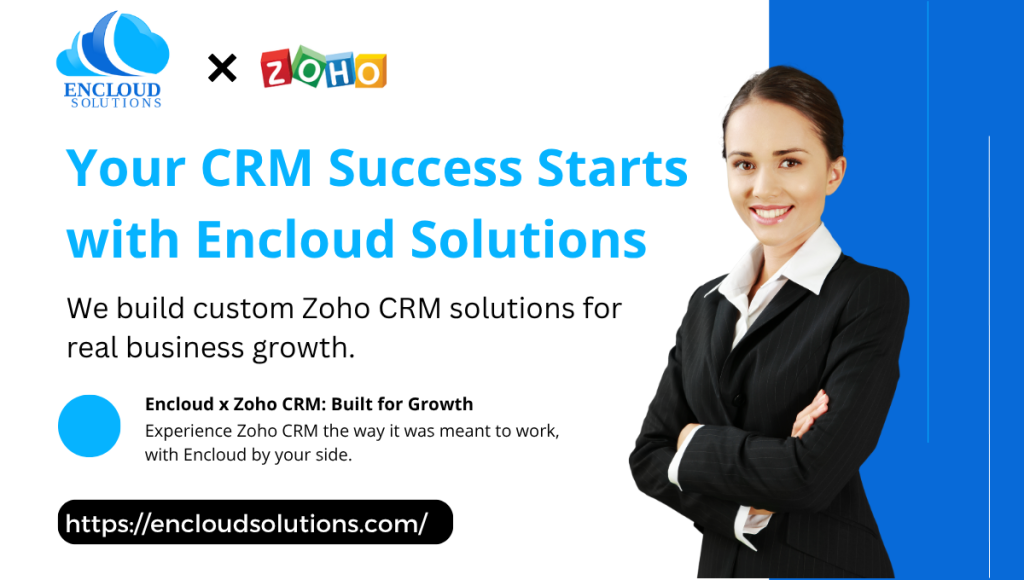
Frequently Asked Questions
What language is Zoho CRM developed in?
Zoho CRM is primarily built using Java. Java’s platform independence means the CRM can run on any device or OS. The Zoho CRM interface uses web technologies (HTML, CSS, JavaScript) to provide a responsive user experience.
What is Zoho CRM used for?
Zoho CRM is used to manage customer relationships and sales pipelines. It stores leads, contacts, companies (accounts), and deals/opportunities. Sales teams use it to track deal progress; marketers use it to segment and email customers; support teams track tickets or customer history. In essence, it centralizes all customer and sales data (contacts, communications, transactions) so teams can collaborate effectively.
Does Zoho have SEO?
Zoho CRM itself isn’t an SEO tool, but the Zoho ecosystem includes SEO features. For example, Zoho Sites is a website builder with built-in SEO optimization (sitemaps, meta tags). Zoho Commerce also provides SEO tools for online stores. Zoho’s marketing suite (Marketing Plus) supports SEO campaign management. So yes, Zoho offers SEO capabilities through its web and marketing products.
What is the architecture of Zoho CRM?
Zoho CRM is a multi-tenant cloud application. This means multiple companies share the same software infrastructure securely, while their data remains isolated. It runs on distributed server clusters that auto-scale with demand. The system provides real-time synchronization: when a user updates a record, changes propagate instantly. Zoho handles all backend maintenance (servers, databases), delivering a reliable, always-on CRM service.
What technology does Zoho use?
Zoho’s core technology stack centers on Java for its backend services, along with enterprise databases and cloud infrastructure. Zoho provides RESTful APIs and SDKs (including Java and Deluge) for integration. The front end uses modern web frameworks. In summary, Zoho combines enterprise-grade tech (Java, cloud servers) with flexible developer tools to deliver scalable CRM solutions.
What is the structure of a CRM?
Most CRMs have a relational, modular structure. Core modules include Leads, Contacts, Accounts (Companies), and Deals/Opportunities. These tables link together: for example, each Contact belongs to an Account, and leads convert into deals. Zoho CRM’s documentation lists Leads, Contacts, Accounts, and Deals as core modules, plus supporting modules like Activities, Products, and Campaigns. Essentially, data flows through these linked tables – that modular design is common to all CRMs, allowing you to extend with custom modules as needed.
What is Zoho CRM’s Dashboard?
Zoho CRM provides customizable dashboards where you can display charts and metrics (e.g., pipeline value, sales cycle length). You can drag-and-drop dashboard components to see key KPIs at a glance. Managers often set up dashboards for sales targets, while reps see their own lead stats. Dashboards update in real-time with your CRM data, helping teams stay on track and make data-driven decisions.
